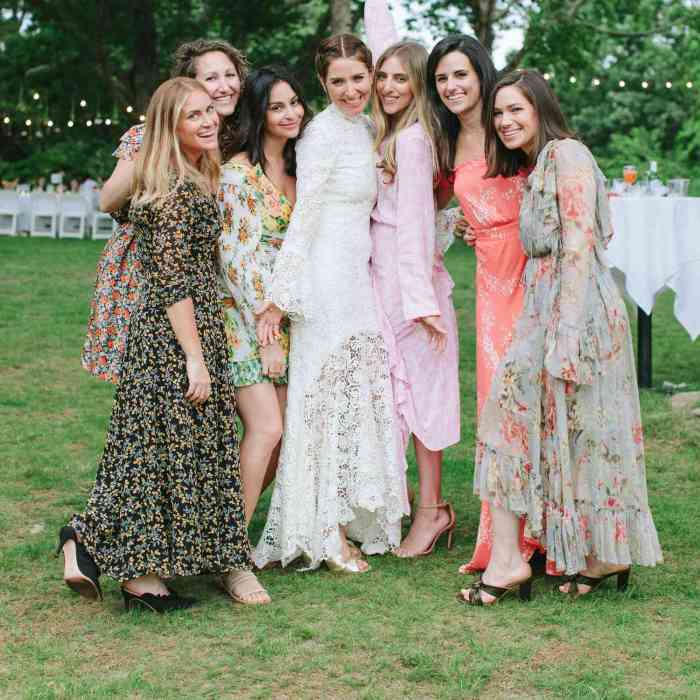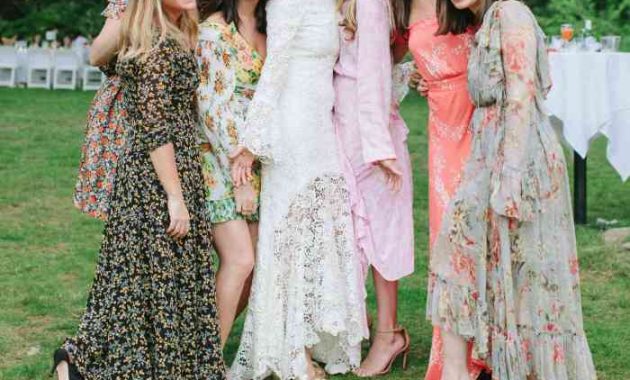Understanding the Boutique Wedding Dress Market: Boutique Dresses For Weddings
Boutique dresses for weddings – The boutique wedding dress market caters to a discerning clientele seeking a unique and personalized experience. This segment prioritizes quality, craftsmanship, and a level of service beyond that offered by mass-market retailers. Understanding this target audience and their preferences is crucial for success in this niche.
Target Audience Definition
The typical boutique wedding dress customer is a modern bride who values individuality and appreciates the finer details. She’s often willing to invest more for a superior product and personalized service.
Demographics include women aged 25-40, with a higher-than-average disposable income. They are typically well-educated and appreciate luxury goods. Price range typically starts at $2,000 and can extend upwards of $10,000 or more, depending on the designer and level of customization. Their lifestyle reflects a preference for quality experiences and personalized services. Fashion preferences lean towards classic elegance with a modern twist, often incorporating unique details and high-quality fabrics.
Dress Styles and Trends

Source: vogue.com
Boutique wedding dress styles encompass a wide range of options, catering to diverse tastes and body types. Current trends favor natural fabrics, intricate details, and a focus on sustainability.
| Style | Description | Suitable Body Type | Image Description |
|---|---|---|---|
| A-Line | A flattering silhouette that accentuates the waist and flows gracefully to the floor. | Most body types | A flowing gown, cinched at the waist, with a full skirt that flares gently from the hips, showcasing delicate lace details and a modest train. |
| Mermaid | A form-fitting gown that flares out dramatically at the knees, creating a dramatic silhouette. | Hourglass or athletic figures | A sleek, body-hugging gown that flares out from the knees, emphasizing curves. The gown features intricate beading on the bodice and a subtle sweep train. |
| Sheath | A simple, elegant style that skims the body without being too tight. | Slender figures | A classic, straight silhouette that falls elegantly to the floor. The gown is made of a luxurious silk crepe and features a simple, elegant neckline. |
| Ballgown | A full-skirted gown that creates a princess-like look. | Most body types, particularly those who want to emphasize a smaller waist | A voluminous gown with a fitted bodice and a full, dramatic skirt. The gown is made of luxurious satin and features delicate embroidery details. |
Current trends include the use of sustainable fabrics like organic cotton and recycled silk, as well as vintage-inspired designs and minimalist aesthetics. Boutique dresses offer unique selling propositions like superior quality materials, intricate hand-crafted details, and personalized design options unavailable in mass-produced lines.
Boutique dresses offer a unique and stylish alternative for wedding attire, providing a more personal touch than mass-produced options. For those seeking truly breathtaking designs, browsing trends for a beautiful wedding dress 2023 can be inspiring. Ultimately, whether you choose a bespoke boutique creation or a design from a larger collection, finding the perfect dress is key to a memorable wedding day.
Boutique Shopping Experience
The boutique shopping experience is designed to be personalized and luxurious. Brides can expect one-on-one consultations with stylists who understand their vision and offer expert advice. Appointments are typically scheduled, ensuring a relaxed and private setting. This contrasts sharply with the often overwhelming experience of shopping at larger department stores or online.
Purchasing from a boutique offers several advantages over online retailers: the ability to try on dresses, receive expert styling advice, and build a relationship with a trusted professional. The personalized experience and assurance of quality are significant draws.
A typical customer journey might involve browsing online, scheduling a consultation, trying on dresses, selecting a gown, ordering alterations, and final fitting.
Pricing and Value Proposition, Boutique dresses for weddings
Boutique wedding dresses are typically more expensive than those found in department stores or online. This higher price reflects the use of higher-quality materials, intricate hand-crafted details, and the personalized service provided. The price difference justifies itself through the superior quality, unique design, and personalized attention.
Factors contributing to the higher cost include the use of premium fabrics like silk, lace, and tulle, intricate embellishments like beading and embroidery, and the skilled labor involved in creating each dress. Boutiques justify their premium pricing through superior service, including personalized consultations, alterations, and a commitment to ensuring the bride feels confident and beautiful on her special day.
Marketing and Branding

Source: brides.com
Marketing strategies for boutique wedding dresses should focus on showcasing the unique selling propositions of the brand and the personalized experience. Targeting should be highly specific, focusing on social media engagement, influencer marketing, and partnerships with wedding planners.
A hypothetical boutique, “Seraphina Bridal,” could utilize a logo featuring a delicate, elegant script font and a subtle floral motif. Brand messaging should emphasize timeless elegance, personalized service, and the creation of a dream dress.
- Social media marketing (Instagram, Pinterest)
- Influencer marketing (collaborations with wedding bloggers and Instagrammers)
- Print advertising (in bridal magazines and local publications)
- Public relations (press releases and media outreach)
- Website with high-quality photography and detailed dress descriptions
Sustainability and Ethical Considerations
The growing demand for sustainable and ethically sourced wedding dresses reflects a shift in consumer values. Brides are increasingly aware of the environmental and social impact of their choices.
Several brands are committed to sustainable practices, using organic fabrics, reducing waste, and ensuring fair labor practices. The environmental impact of different fabrics varies significantly; natural fabrics like organic cotton and linen are generally more sustainable than synthetic options like polyester.
Dress Customization and Alterations
Customizing a boutique wedding dress allows brides to create a truly unique gown that perfectly reflects their personal style and body type. Alterations are crucial in ensuring a perfect fit and enhancing the overall look of the dress.
- Hem adjustments
- Bustle addition
- Waist alterations
- Shoulder strap adjustments
- Lengthening or shortening sleeves
- Adding or removing embellishments
Accessories and Complements
Accessories play a vital role in completing a bridal look. Carefully selected accessories can enhance the overall aesthetic and reflect the bride’s personality.
A complete wedding look might include a classic A-line gown with delicate lace detailing, a cathedral-length veil with delicate embroidery, elegant pearl earrings, a simple diamond necklace, and ivory satin heels. The overall aesthetic would be one of classic elegance with a touch of romanticism.
- Choose accessories that complement the style and details of the dress.
- Consider the overall wedding theme and venue when selecting accessories.
- Don’t overdo it – less is often more.
- Ensure accessories are comfortable and practical for the entire day.
FAQ Summary
What is the average price range for boutique wedding dresses?
The price range varies significantly depending on the designer, materials, and level of customization, but generally starts around $1,500 and can extend well into the tens of thousands of dollars.
How far in advance should I start shopping for my boutique wedding dress?
It’s recommended to begin shopping 9-12 months before your wedding date to allow ample time for alterations and potential delays.
Can I bring guests to my boutique appointment?
Most boutiques have a limited number of guests allowed per appointment, typically 1-3. It’s best to confirm their policy in advance.
What payment methods do boutiques typically accept?
Boutiques usually accept major credit cards, debit cards, and sometimes offer financing options. Check with the individual boutique for their specific payment methods.

